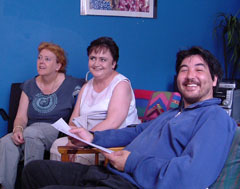
| HOME |
| NERVE |
| REVIEWS |
| ARCHIVE |
| EVENTS |
| LINKS |
| ABOUT US |
| CONTRIBUTORS |
| BACK ISSUES |
| CONTACT US |
 Poetry
from the Edge
Poetry
from the Edge
By E. Hughes
I meet Judy Mazonowicz, and the new trainee Nathan, outside the No 7 Deli on Falkner Street, on what is a beautiful and sunny day. We talk about poetry, and we talk about the group who meet relatively regularly, in Mary Seacole House. Most, if not all, of the regulars writing poetry have had mental health problems, and have found some release and healing through writing poetry, and coming together as a group.
The group, with Judy's help have published two books of poems, one of which I have read and is excellent, it's called 'Poems from the Heart of the House'.
We are led into the front room of Mary Seacole house, it's cosy and spacious, and I am immediately at ease. The sun bursts through the windows, and casts delicious light throughout the room. I meet and say hello to each new group member as they arrive; they are a pleasant and friendly bunch, and all quite different.
 The
group are: Nicholas Yin, Peter Jackson(also a support worker), Jean Connor-Jones,
Cemile Morrison, Glyn Davies, Ann O'loughlin and June Gant. Judy is the
group co-ordinator and leads the afternoon 'workshop', which today is
'the difference between metaphors and similes'. Wistful poems are read
out, to appreciative silences, and ideas are bounced off each other, to
produce in many cases what are very different poems in many different
styles.
The
group are: Nicholas Yin, Peter Jackson(also a support worker), Jean Connor-Jones,
Cemile Morrison, Glyn Davies, Ann O'loughlin and June Gant. Judy is the
group co-ordinator and leads the afternoon 'workshop', which today is
'the difference between metaphors and similes'. Wistful poems are read
out, to appreciative silences, and ideas are bounced off each other, to
produce in many cases what are very different poems in many different
styles.
The members tell me throughout the afternoon, that writing poetry is therapeutic, and it has given them hope and renewed confidence in their own abilities, and a release, even a safety valve, from mental health problems of varying kinds. They are warm, humorous and happy, at least within the group. That is a start.
It is surprising to know that much of the work showcased in the two books was written in 40-minute sessions from afternoon's past. It is high quality, and reads well, and merits re-reading many times.
I ask a couple of questions: 1) Why write poetry? Does it take courage to write personal poetry? I am supplied with many answers: "To fill in time.", "Writing poetry gives you confidence.", "It's very therapeutic, writing, but tough showing other people." Glyn says: "I could write poetry from a grocery list", whilst Pete says "I write whatever is on my head."
Nicholas explained to me that writing poetry is cathartic, and says a lot of art is about mental health and about the mind. He added that a lot of art, prose and poetry explores the mind and that there was a link between creativity and sensitivity; maybe sensitive people, imaginative people are more likely to become mentally ill or troubled. I am taken with his explanations.
It has been a fulfilling afternoon, and I have learnt a lot from them, and they have given me a lot more than I could have imagined. The standard of the work alone is very high and interesting; I can believe in poetry when it's this good.